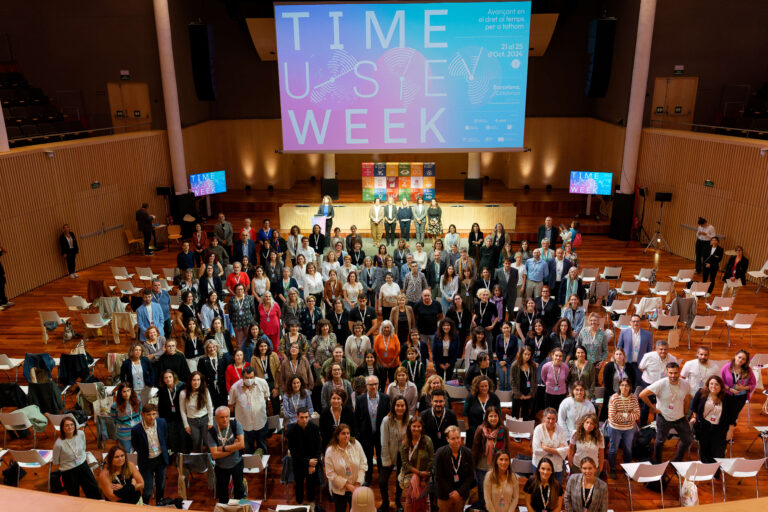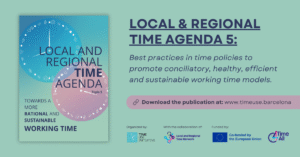- 200 world-leading organizations in time policies update their commitment and the new work plan of the Declaration.
- The new work plan was presented during the inauguration of Time Use Week, with the participation of the Minister for Equality and Feminism, and representatives of the Barcelona City Council, the Barcelona Provincial Council and the Metropolitan Area, accompanied by most of the signatories.
Currently, the right to time is unevenly distributed among citizens, and time poverty in its various forms exists in all countries and regions, as has been recognized by the United Nations Economic Commission for Europe. According to the European Parliament’s poverty report, in Europe, time poverty affects between 20-30% of the population with dependents and in Latin America, it reaches up to 50%. This fact is added to a wide discomfort in the current organization of hours, where more than half of European workers have expressed a high degree of exhaustion (Stadista, 2022). This unequal access to the use of time and the social organization of time directly affects people’s health, equality between them, and individual and collective productivity; especially affecting people in the most precarious economic situation and women. It is estimated that between 1-2% of GDP is lost annually due to the consequences of lack of sleep.
To improve this situation, in October 2021, 75 leading world institutions in time policies, including 15 Catalan ones, signed a pioneering declaration that committed them to work together to make the right to time a right of citizenship, to improve health, sustainability and equality among all people, while executing a joint work plan. Among the first signatories were: the International Time Use Research Association, the group of workers of the European Economic and Social Council, Strasbourg, Milan and Montevideo, and 15 leading Catalan organizations in this field, among them, the Barcelona City Council, the Generalitat de Catalunya, the Provincial Council of Barcelona and the Metropolitan Area of Barcelona. Today, during the Inauguration of Time Use Week 2024, accounts were given of what has been done so far and the new work plan 2024-2026 was presented.
The Time Use Week, or Week of Schedules and Time, is the most relevant international event for the promotion of knowledge and to publicize practices on time policies. This year’s edition, the tenth, is held from October 21st to 25th, in a hybrid format, in Barcelona and throughout Catalonia, under the title “Advancement in the right to time for everyone” and aims to put an emphasis on approaching the right to time holistically.
Two years later, the objectives of the 2022-2023 work plan have been met
The Work Plan of the Barcelona Declaration for 2022 and 2023 committed to develop time policies and the right to time in two areas: the urban and regional, and the European. As presented below, the proposed actions have been satisfactorily completed.
Concept of World Capital of Time Policies has been created, with Barcelona in 2022, Bolzano in 2023 and Strasbourg in 2024, and an Urban and Regional Time Agenda has been developed, which published annually good practices of time policies in terms of conciliation and life balance, mobility, governability of nighttime and democracy. As a result, 15 new international institutions have joined the Network, such as Bogotá, Buenos Aires and the South Tyrol region.
At the European level, a proposal was presented to the European Commission in 2022 for the abolition of seasonal time change based on scientific evidence and a policy paper has been created for the balanced organization of decent working time also on an international scale, presented at Time Use Week 2023 and prepared by international experts. To prepare this document, they were based on the in the Spanish State (Ministry of Labor and Time Use Initiative, 2023) and the Guide to establish a balanced arrangement of time work (ILO, 2019).
In addition, progress has been made in the recognition of the right to time, in the field of equality, especially by defining the problem of time poverty and the implications that having more time of your own can benefit citizens, introducing the debate directly in the United Nations system, as well as in other Latin American regional organizations.
The new work plan is updated and 100 new organizations added
After fully implementing the actions foreseen in the 2022-2023 Action Plan, the new action plan sets objectives in four work areas 1) make effective the right to time from local and regional bodies to improve the equality and individual and collective well-being, 2) fostering the connection between the world of time use research and public time policies, especially now that we are facing a new wave of results from time use surveys time, 3) implement key actions to achieve a balanced organization of time dedicated to work and personal and family life and 4) advance the recognition of the right to time, especially in the field of equality, introducing the debate directly into the United Nations system, as well as in other Latin American regional organizations.
In addition, the commitments will be supported by 100 new organizations that have recently joined the pact, among which stand out: the Organización Mundial de Ciudades y Gobiernos Locales Unidos (CLGU), the main global association that works for the reduction of the working day (global 4-day week), as well as new cities and regions and pioneering organizations in the right to time.
During the inauguration of Time Use Week, the key speakers highlighted are:
- Eva Menor, Minister of Equality and Feminism of the Generalitat de Catalunya closed the event by reminding that “regardless of the time available, women spend more than twice as much time on unpaid work as men”. “That’s why, from the Department of Equality and Feminism, we are committed to policies that allow us to achieve co-responsibility in unpaid work such as caregiving and household tasks”, continued Menor, who affirmed that “co-education is essential to educate in the values of equality, to break gender stereotypes and thus reach effective equality”.
- Raquel Gil, Councilor of Economic Promotion, Work, Feminisms and Democratic Memory of the Barcelona City Council, participated in the inauguration and declared that “The bet we are making from the Barcelona City Council involves a deep social and economic transformation and that is precisely why it will only be possible if all administrations are involved or, at least, a large majority and always with the collaboration of the productive fabric and all economic and social agents”
- Alba Barnusell Ortuño, President of the Area of Social Sustainability, Life Cycle and Community of the Provincial Council of Barcelona, mentioned that “From the Provincial Council, we know that the municipalities are key agents in this challenge and for this reason, this year we wanted to present the Guide to Local Time Organization Plans in the framework, a resource that should allow us to recognize, promote, facilitate and make possible planned, coordinated and effective time policies in the municipalities of the province of Barcelona. A guide that I hope can also serve as a reference in promoting local time policies on a global scale.”
- Gemma Badia, CEO of Social and Equality Policies of the Metropolitan Area of Barcelona (AMB), has stated that “For the Metropolitan Area of Barcelona in this new stage of deployment of the Barcelona Declaration, we will focus our efforts to promote effective equality in the distribution of time between men and women by actively involving town councils and the business and productive sector of our metropolis within the framework of the Metropolitan Pact for the Right to Time.”
- Marta Junqué, director of the Time Use Initiative “Three years ago it seemed impossible to achieve what we have achieved and we are very happy that more and more organizations are joining. We appreciate the trust of all the institutions for choosing us as the technical secretariat of the Declaration to facilitate and monitor the fulfillment of the commitments, as well as the agreed 2024-2026 Work Plan.”
OTHER HIGHLIGHTS OF TIME USE WEEK:
- More than 1,000 people from all over the world will participate
- Participation of more than 40 international speakers, both in person and online
- More than 20 specialized sessions aimed at policymakers, researchers, and interested organizations.
- Implementation of 50 transformative initiatives throughout Catalonia by organizations in the social and productive field. We highlight:
- 3 pilot tests for reducing working hours, such as the Association of Large Families of Catalonia-FANOC of 37.5 hours, the Metropolitan Strategic Plan of Barcelona and the Federation of Labor Cooperatives of Catalonia of 32 hours.
- 7 pilot tests of flexible working hours measures, such as the Confederation of Autonomous Workers of Catalonia – CTAC or One Tandem.
- 2 pilot tests of measures or permits, beyond those established by the regulations (Federación Española de Asociaciones Pro-Lactancia Materna and Consejo Nacional de las Mujeres de España)
- 5 initiatives to implement the time policy self-assessment tool (such as Marinva or Espai Ambiental SCCL, among others announced on the web)
In addition to the opening event, other highlights of Time Use Week 2024 will be:
- 21/10, 10.30 a.m.: II Meeting of the Catalan Network for the Right to Time
- 21/10, 2.00 p.m.: Presentation of the guide of the Diputació de Barcelona for the implementation of the local time organization plan and the figure of Coordinator in Time Policies
- 2 Panels of international experts:
- 21/10, 3.45 pm: How time policies and the right to time provide key solutions to the challenges of the 21st century
- 22/10, 10.20 a.m.: How the new time-use surveys provide key data to promote innovative public policies
- 22/10, 11.45 a.m.: General Assembly of the Global Network of Local and Regional Governments for Time Policies, with more than 40 pioneering cities in time policies.
- 6 Practical Workshops for Governments on how to implement time policies that address real problems: night governance, reducing peak hours, time off for caregivers and more.
- 23/10, 9.30-14.00 h: Conference on Rationalization of Working Time for social and productive organisations, which will take place in the BIZ Barcelona Salon (at the Fira de Barcelona Montjuïc) which will include:
- Debates on the impacts on companies implementing the reduction of working hours and the Time Use Laws.
- Presentation of the tools for more rational and co-responsible use of time by Barcelona City Council and the Barcelona Metropolitan Area, as well as cases of success in the organization of time by companies members of the Nust Network.






